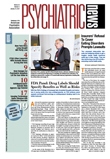Can people be “inoculated” against stress? Researchers studying resilience believe they can. They say adopting protective skills associated with resilience will enable people to cope better with stress and bounce back after adversity. Lacking resilience, they may respond poorly and could develop anxiety disorders, depression, or posttraumatic stress disorder (PTSD). But just how can people acquire resilience and avoid stress-induced psychopathology?
To answer that question, researchers took a page out of the playbook that super-resilient people use to handle stress and formulated a prescription for resilience that has implications for the prevention and treatment of stress-induced psychopathology.
“When helping patients deal with stressful situations, this may be a good place to start aiding them in their recovery,” Dennis Charney, M.D., Ph.D., dean of research and a professor of psychiatry at Mt. Sinai School of Medicine, told Psychiatric News. Charney said resilience can be developed through focused training and cognitive-behavioral therapy (CBT) to form a bulwark against stressful events.
“Also you can learn to recognize your own character strengths and engage them to deal with difficult and stressful situations,” he explained. “We all have things we can do very well. The idea is to build on them when you are faced with stressful situations.”
Charney and Steven Southwick, M.D., a professor of psychiatry at Yale University, identified personality traits associated with resilience in 250 American POWs during the Vietnam War who were held captive for up to eight years and subjected to torture and solitary confinement. Remarkably, years after their release, they had a lower-than-expected incidence of depression and PTSD. To determine how these men, mostly pilots, handled such a dire experience yet in many cases came out stronger than before, they videotaped interviews with them and conducted a battery of neuropsychological tests along with neuroimaging.
In two other studies, they interviewed a group of women who had suffered severe trauma, especially sexual and physical abuse, and a group of people who showed courage and resilience while facing serious medical problems. They found that the same characteristics of resilience in the POWs were present in these other two groups. Charney indicated that these studies will be described in a book he wrote to be published soon by Houghton Mifflin titled The POW Response: A Prescription for a Resilient Life.
Based on the results of the three studies, Charney described the following 10 psychological characteristics that people can work toward to increase resilience:
•
Be optimistic. Optimism is strongly related to resilience, and it can be learned through CBT. Optimists usually have decreased autonomic arousal, use more adaptive coping strategies, and seek supportive personal relationships during crises. “Even in the worst of times resilient people remain optimistic,” Charney said. Women with this disposition have shown a better response to a diagnosis of breast cancer, while men have a lower rate of hospital readmission after coronary artery bypass surgery.
•
Develop cognitive flexibility or the ability to restructure knowledge in adaptive ways to changing demands. It is the basis of psychotherapy for traumatized people, Charney explained. Research has shown that this trait reduces PTSD after combat and speeds recovery after loss of a family member or natural disaster. “Resilient POWs regarded their years in captivity as horrendous, but they learned valuable things about themselves that they would not have learned any other way, which prepared them to face challenges later in life,” Charney said. He explained that cognitive flexibility is linked to neurobiological mechanisms such as memory consolidation.
•
Develop a personal moral compass or shatterproof set of beliefs. Doing so helps people get through adversity. Many victims of Hurricane Katrina and 9/11 attributed their survival to faith, either through religion or spirituality. “Many POWs never lost their faith and prayed every day,” Charney said. After being freed, one man refused to attend a“ coming-out party” until he found a priest and had confession.
•
Be altruistic. Coping with extreme stress is often made easier by helping others. “Altruism is underrated and needs to be used more often as a therapeutic tool,” he asserted. The belief in a survivor mission can be a lifesaver to traumatized people. He said Mothers Against Drunk Driving, one of the the world's largest crime-victim organizations, is indispensable to many women who lost a loved one in a car accident. Similar groups were formed after 9/11. Researchers are now looking at neural circuits related to moral decision making and altruism.
•
Find a resilient role model in a mentor or a heroic figure. This is important “because imitation is a powerful mode of learning,” Charney said. “Heroic figures inspire us to greatness even though they might not achieve success.” He noted that the ill-fated British explorer Ernest Shackleford failed to reach the South Pole, but his leadership qualities and perseverance during the expedition made this one of the greatest survival stories of all time.
•
Learn to be adept at facing your fears. Resilient POWs were found to have this trait, which boosted their resilience and self-esteem, Charney said.“ So recognize that fear is normal and can be used as a guide.” He recommends learning and practicing skills needed to get through one's fears. He said the neurobiological underpinning is well known in terms of extinction and stress inoculation.
•
Develop active coping skills. Resilient individuals do this and create positive statements about themselves in relation to a threat. They also seek active support from others. Charney reported that by training young female Rhesus monkeys to adapt to stress, that is, to become inoculated against it, and cooperate rather than resist during blood collection, Stanford researchers Karen Parker, Ph.D., and David Lyons, Ph.D., helped explain the differences in the biology behind these two types of coping skills.” They reported their findings in the September 2004 Archives of General Psychiatry. Similar human experiments are now under way.
•
Establish and nurture a supportive social network. The value of this was seen dramatically after 9/11 and Hurricane Katrina. “After a disaster we don't need psychiatrists running around talking with people,” Charney asserted. “Intense debriefing doesn't help. What helps is having family members and close friends share the experience with victims, because very few people can go it alone.” He said it's not enough simply to attend a support group and talk with other people. During times of stress, emotional strength comes from close, meaningful relationships.
•
Keep fit. Exercise not only is good for physical well-being but also enhances brain health and plasticity. Charney cited findings for this notion from the 2002 study “Exercise: A Behavioral Intervention to Enhance Brain Health and Plasticity” by Carl Cotman and Nicole Berchtold published in Neuroscience.
•
Have a sense of humor and laugh frequently, according to Richard Wender, M.D., chief of family medicine at Thomas Jefferson University Hospital in Philadelphia. Humor narrows the gap between doctors and nurses and between them and patients, especially children, who often feel helpless and forlorn, and helps them cope with their illness.
Charney recommends developing resilience by training regularly in areas that engage emotions, intellect, morals, and physical endurance and by overcoming challenges. He believes such training affects what type of adults young people develop into and suggests that it could be part of high-school health education.
Charney reported that researchers using techniques of extinction and fear conditioning and memory reconsolidation have identified in animal models regions of the brain associated with stress-related psychopathology. The lateral nucleus of the amygdala forms a link between unconditioned and conditioned fear stimuli, for example, and animal studies have demonstrated evidence of amygdala hyperresponsiveness in anxiety disorders and PTSD, setting the stage for investigating amygdala responsiveness to resilience. He said these regions are now being studied in humans using neuroimaging technology. Neuroendocrine markers of resilience and recovery in humans are also being investigated.
Rachel Yehuda, Ph.D., a professor of psychiatry and director of the Traumatic Stress Studies Division at Mt. Sinai School of Medicine, outlined a translational research agenda for studies of resilience in the July 2006 Annals of the New York Academy of Sciences. She told Psychiatric News that still little is known about resilience, and the construct has not been very well defined.
“I think resilience is a very seductive concept, and we have to operationalize it. But we haven't done that. That's what we need to do now.”
The research and recommendations by Charney and his team appear to be a major step in doing just that. ▪

